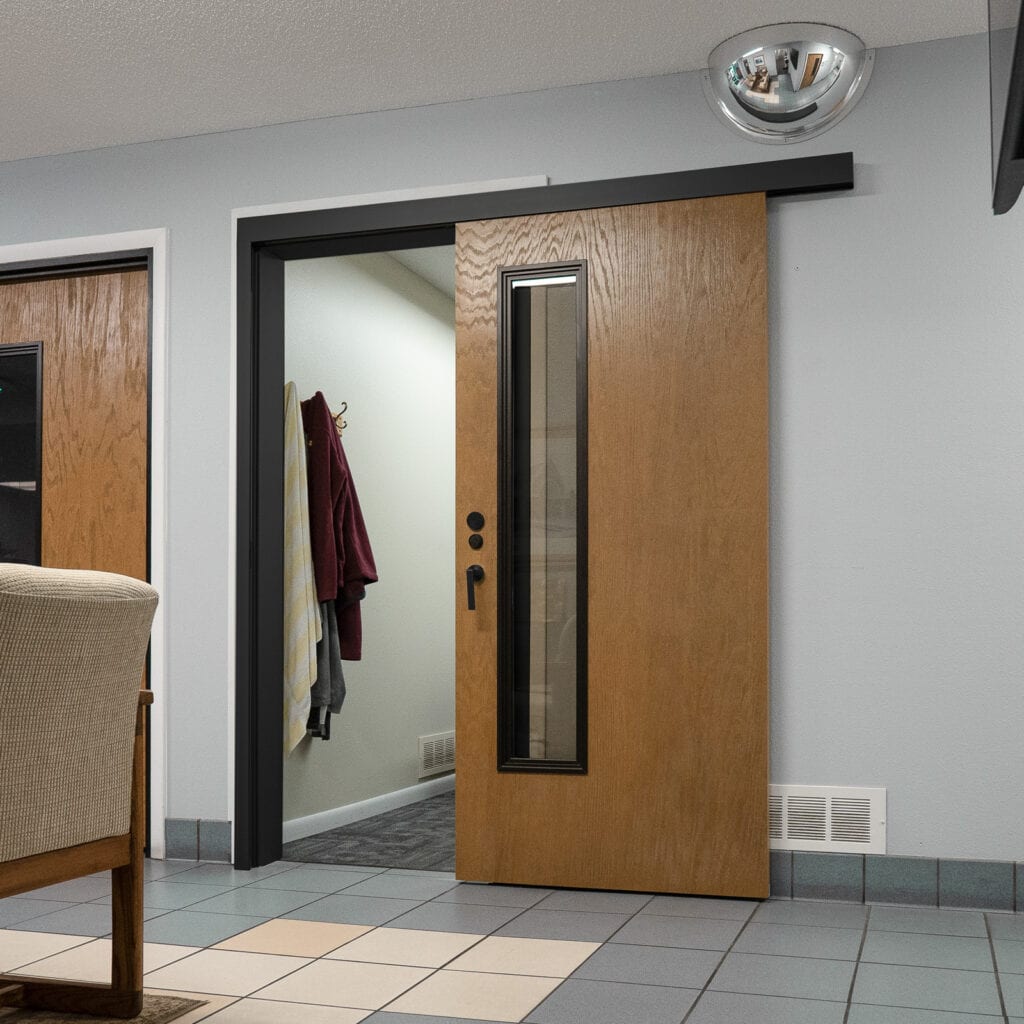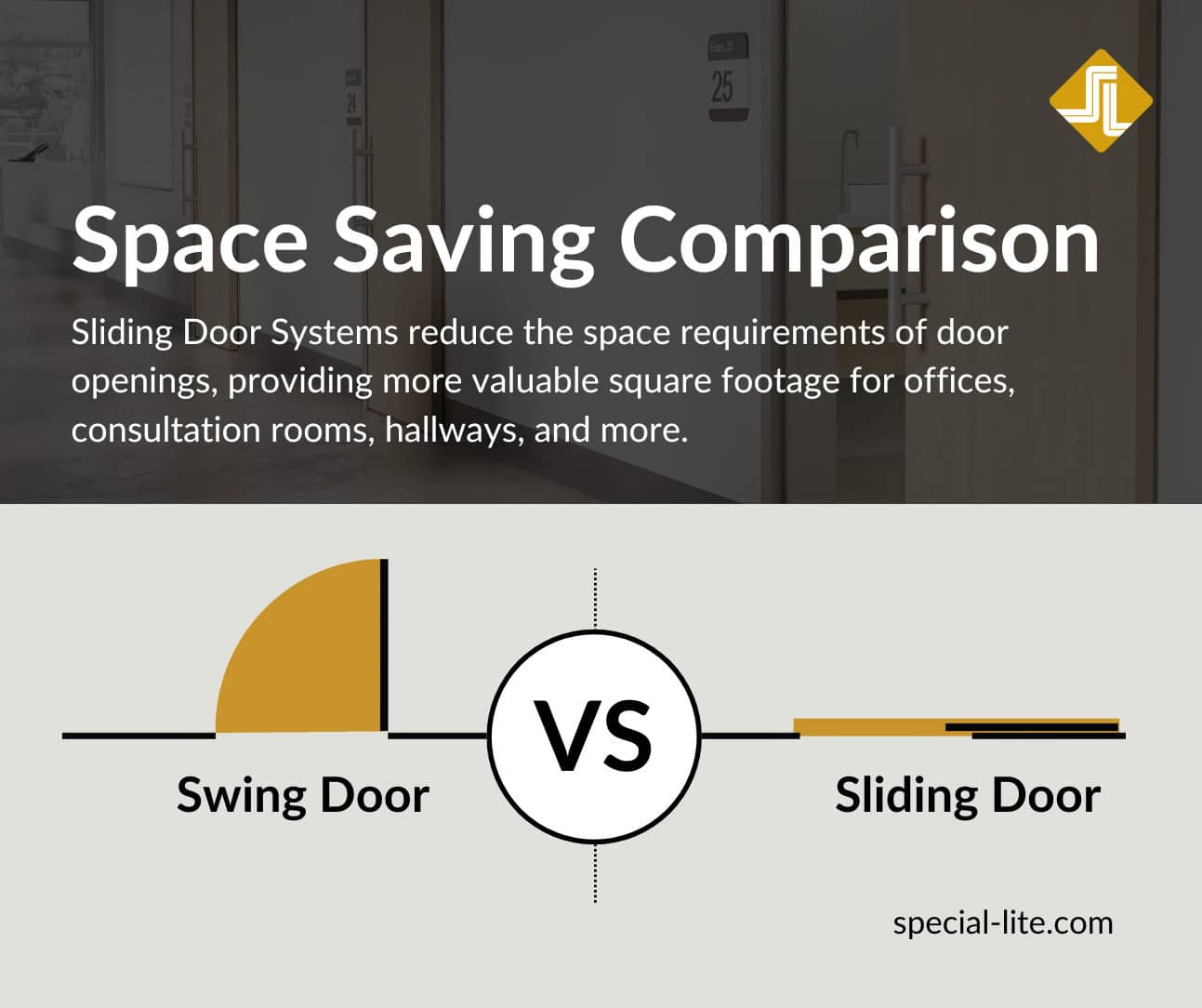
How to choose the right commercial sliding doors for a business or building
Choosing the right commercial sliding doors for a business or commercial building is a critical decision that can significantly impact a space’s functionality and aesthetics. These doors serve as an entry point to buildings as well as interior spaces like offices, conference rooms, exam rooms, and more. Whether interior or exterior, they are vital in ensuring security, accessibility, energy efficiency, and overall design. Therefore, it is crucial to carefully consider several factors when selecting sliding doors to best suit your specific needs. Here, we’ll explore critical considerations, different types of commercial sliding doors, essential features to look for, and the benefits of making the right choice.
Commercial Sliding Door Systems
When selecting commercial sliding doors, it’s essential to understand the different types available and their unique features. Let’s explore some of the most common types of sliding door systems, how they are mounted, and the various door options that can be used in commercial settings.

Surface-mounted Sliding Door Systems
Surface-mounted sliding door systems slide along the wall’s surface, outside the corridor, hallway, or inside the room. Barn doors come to mind for many when considering this option, especially in residential settings. More robust commercial offerings typically offer a fully concealed floor guide, a cased opening frame, and sidelite options. Acoustic and smoke rating options are other options that can be incorporated.
Flush-mounted and Inset Sliding Door Systems
Flush-mounted sliding door systems fit the wall profile, making it flush. They also offer a fully concealed floor guide and can utilize sidelites or insets.
Now that we’ve covered sliding door systems, let’s evaluate the various door options.
Aluminum sliding doors: They are commonly used in commercial applications and are known for their durability and versatility. They are lightweight yet robust, making them suitable for high-traffic areas. The SL-16 for example, utilizes a poured-in-place polyurethane core that bonds firmly to stile and rails, reinforcement and face sheets. A wide range of face sheet options is available to compliment the look you desire —everything from smooth, fluted, embossed, and stainless steel.
Aluminum-framed interior doors require minimal maintenance and they can be customized with different finishes to match the desired aesthetic.
Wood and resilient wood grain sliding doors: Wood sliding doors are an excellent choice for businesses aiming for a warm and elegant look. These doors provide a timeless appeal and can be customized to fit various architectural styles. Wood doors can offer excellent thermal insulation and soundproofing properties, making them suitable for offices, conference rooms, and retail establishments.
As with any wood door, there are downsides to consider. Weight, rot, and durability are chief among them. FRP doors with a wood grain look offer all the advantages of real wood but with far fewer disadvantages. Through-color FRP is another option.
Another option is laminate doors which are also generally made of wood compressed with another filling material like cardboard or particleboard.
Automatic sliding doors: They offer the utmost convenience, opening and closing automatically, allowing for hands-free entry and exit. Equipped with sensors, these doors can detect approaching individuals and smoothly slide open, providing easy accessibility. They are commonly used in busy environments such as retail stores, office buildings, and hospitals.
Glass sliding doors: Glass doors are a popular choice for commercial spaces due to their transparency, allowing maximum visibility and the influx of natural light. They create an open and inviting ambiance, making them ideal for storefronts, restaurants, and hotels. Additionally, various glass options, such as tempered and laminated, offer improved safety and security features.

Sliding Door Considerations
Choosing the right commercial sliding doors requires a thorough evaluation of various factors to ensure they meet the specific needs and requirements of your business or commercial space. Below are some key considerations to keep in mind.
Identifying the specific needs and requirements: Before diving into the selection process, it’s essential to understand your business’s unique needs. Assess the doors’ intended use, the foot traffic volume, and any specialized functionality required. Patient Care Team Pods are a popular design concept for healthcare facilities, and a complete turn-key sliding door system like SpecSlide is perfect for them.
Assessing the space and installation options: When choosing sliding door types and configurations, consider the available space and layout. Depending on the space constraints, you may opt for the space savings from a sliding door option compared to a typical swing door. On average, sliding door systems like these can save ten to 25 square feet of space per room. Imagine the space savings you can achieve with an entire floor of sliding door systems!
Determining the desired functionality: Evaluate the intended usage patterns, such as the frequency of opening and closing and the need for automated features. Consider the operational requirements, including efficiency, safety, and accessibility options. Ease of movement for all is a crucial consideration.
Long-term value: Consider the long-term benefits and cost-effectiveness. Are you choosing a system requiring a lot of maintenance and upkeep? Don’t compromise on quality and security.
Choosing the Right Commercial Sliding Door Features
In addition to the type of sliding doors, selecting specific features dramatically impacts the functionality, security, and aesthetics. Here are some key features to consider:
Door size, configuration, and operation: Based on the entry requirements, determine the appropriate size of the doors. Look for manufacturers like Special-Lite that will work with you to provide the right door.
Consider the space available for door operation. Remember that you can save around ten to 25 square feet of space per room.
Make sure you take clear opening width and ADA accessibility requirements into account.
Those space savings add up when considering an entire commercial space floor or floors. Sliding doors often see less abuse potential than swing doors.
Security options: Evaluate your business’s security needs and choose doors with robust locking systems, access control features, or sensors for added protection.
Glazing options: When selecting the glazing options for glass sliding doors, consider the desired level of transparency, insulation, and energy efficiency. Options such as tempered glass, laminated glass, or those with energy-efficient coatings provide enhanced safety and thermal performance. Don’t forget about sound ratings. If sound transmission is a chief concern, consider investing in aluminum framing with a high STC rating. This is especially important for conference rooms and other office spaces.
Cycle testing: Repeatedly opening and closing doors to simulate extended real-world use assesses durability, performance, and reliability. This testing is crucial as it ensures the doors can withstand frequent operation without failure, maintain smooth functionality, and meet safety standards. Most commercial sliding door systems promote 100,000 cycle tests, but this option has surpassed 300,000, and it’s still going (without the need for maintenance).
Additional features: Explore additional features that can enhance the functionality and convenience of sliding doors, such as automatic sensors for hands-free operation, emergency exits for safety compliance, and weather seals to prevent drafts and reduce energy loss.
Other questions to consider include:
- Are they easy to clean and maintain?
- Can you quickly move equipment from one area to another?
- Do they offer acoustic features to help ensure a private and quiet environment? This is especially important in healthcare or patient areas.
- What kinds of sidelite framing options are available?
- Are smoke rating upgrades available?
Installation and Maintenance of Sliding Doors
Once the selection process is complete, professional installation is of utmost importance to ensure optimal performance and longevity. Here are some considerations for installation and maintenance:
Finding reputable suppliers and experienced installers: Research and choose reliable suppliers known for their quality products who work with trusted partners, including distributors, to ensure your installation matches that same level of excellence. Special-Lite, for example, has offered interior sliding door systems for years. You can find projects in various pharmaceutical, healthcare, educational, and financial-related projects, from laboratories, patient pods, offices, hospitality areas, and conference rooms. Ensure your installers have expertise in commercial sliding doors and comply with local building codes and safety regulations.
Routine inspections and repairs: Schedule regular inspections to identify any potential issues and address them promptly. This includes checking for proper alignment, smooth operation, and the functionality of security features. Promptly address maintenance or repair needs to avoid costly repairs or system failures. Of course, there are options specifically designed for little to no maintenance.
Warranties: Some manufacturers publish warranties; others require you to contact them. But overall, sliding door systems are generally covered for one to three years and some may only be covered with an add-on. On the other hand, SpecSlide, Omega, and LiteSpace are covered with a no-hassle 5-year warranty, and the door is covered for even longer for additional peace of mind. That may not always be the case with other options. Be sure to inquire about door warranties, exclusions, and especially extended warranty options; all great additional protections to consider when researching and choosing your sliding door system.
Compliance with regulations and safety standards: Ensure the selected doors comply with relevant local laws and safety standards. This includes fire-rated doors for specific applications, ADA accessibility requirements, and adherence to building codes.
Choosing the right commercial sliding door is a serious decision. By considering your business’s specific needs, understanding the different types available, evaluating essential features, and ensuring professional installation and maintenance, you can make an informed decision that will positively impact your business for years.
Sliding doors should provide enhanced security, accessibility, and energy efficiency and match your aesthetics, creating a welcoming and efficient environment for employees and customers.
To make the best decision for your needs, consult industry professionals and seek expert advice to ensure a successful selection and installation process. Special-Lite Sales Reps are ready to help you take your project to the next level. Another helpful resource is this comparison guide that walks you through each of the Special-Lite Sliding Door Systems.